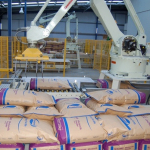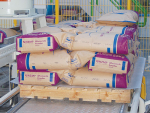The plant, which began producing on August 1, is a joint venture between Tuaropaki Trust and Wairarapa Moana Trust, and strategic partners including local Maori trusts, the Maori trustee, Global Dairy Network and a Vietnamese dairy company, Vinamilk.
Miraka, though off the beaten track north west of Taupo, past Kinloch – where mist often clings to the rolling hillsides of Mokai – is in fact located beside its power source, the geothermal power station part-owned by Tuaropaki. Natural gas does not feature. The day I visited the factory, tankers from Tatua and Fonterra were pulling in, taking advantage of the plant's spare capacity.
This $90m state-of-the-art factory can process 1.1 bn L of milk per day, but is now handling about 900 m L per day. The plant includes a milk reception area, evaporator, spray drying facility and warehouse.
Chief executive Richard Wyeth (36), says a strategic decision was taken not to produce to full capacity initially to avoid unnecessary pressure on the plant during start-up. The plant is running well and has had no major glitches. It has the advantage of geothermal steam. From day one product quality has been excellent, Wyeth says.
"Most of the product is going to Vietnam and China, [and] smaller parcels to Australia and the Pacific Islands, US and Mexico. We're also looking at markets in the Middle East.
"We are trying in year one to keep the focus reasonably simple, looking at ten customers and four or five products, all essentially whole milk powder. But we'll produce some skim milk powder next year."
The business is focused entirely on the commodity market, Wyeth says. "I want to ensure we make good quality commodity products before we go looking into any consumer packs or moving up the value chain. At this stage we have a three-five year plan to move into other product streams."
Having Vinamilk as a strategic partner has worked well for Miraka. "They're a good partner because they're an end user of product. They're not buying our product then trading it in their market. They're actually using it for their own consumption, including UHT and condensed milk and yogurt."
The developing Asian market targeted by Miraka offers long term growth, with their desire to eat more dairy products, Wyeth says. "Historically... a lot of sweetened condensed milk was consumed. Now... it's more UHT milk and in time there'll be a drive for more liquid fresh milk on the shelves."
Any move by Miraka into the consumer products market will be with a partner in the country of destination, where that partner will better understand local tastes."When I was in China I had yogurt with cheese chunks in it and even a pea-flavoured ice block. Those are the sort of things we have to understand."
As the bags of WMP roll out of the factory, Wyeth is turning his attention to attracting more suppliers, even launching a campaign to this end. There is now a 50/50 split – Maori/non-Maori, though in fact about 65% of Miraka's milk comes from Maori trusts and Maori farmers. This results from Maori farms being larger (560 cows average) verses the 350 national average.
"In year one we were planning to run at 80% capacity.... We're after another 40 m L of milk to reach our capacity.... We have the advantage of shareholders who are also farmers, so we have a solid basis of supply, which gives other farmers confidence to come in."
The balance sheet is strong and debt-to-equity ratio low. Maori are in the venture for the long haul, good for the operation's viability.
Miraka collects milk from 70km around – Rotorua, Tokoroa, Bennedale and south to Turangi. Wyeth admits dairy farming on the central plateau is not easy, but says the geographic spread of their catchment area is helpful. Miraka owns no tankers, instead contracting collection to a local company, Dairy Fresh.


















